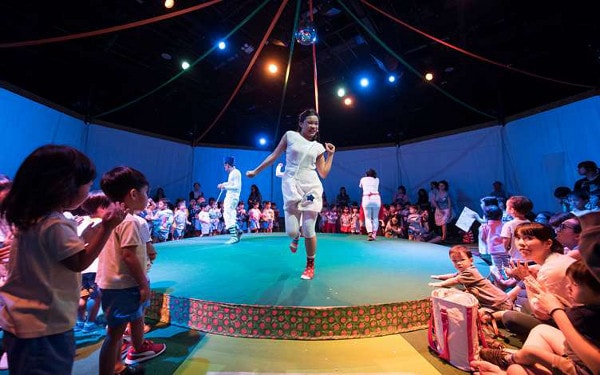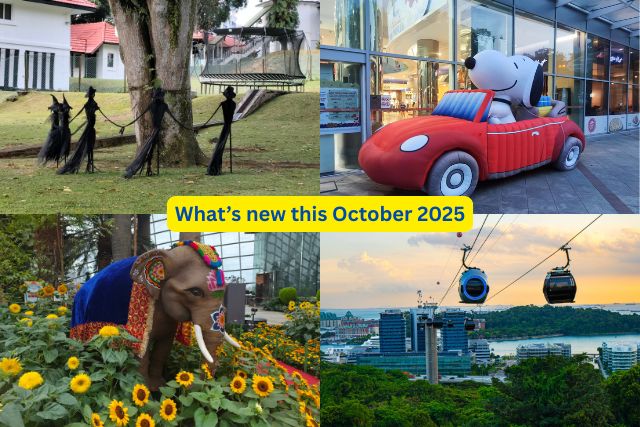One in 150 children in Singapore has autism, a rate higher than the World Health Organisation’s global figure of one in 160 children. According to data from KKH and National University Hospital (NUH), from 2010 to 2014, there was a 76 per cent increase in the number of children diagnosed with developmental delays, learning difficulties and autism spectrum disorders (ASD) in Singapore.
For parents of these children, it can be difficult to envision a bright future for their children and it can be a daily struggle to help their children reach their full potential. However, early identification of developmental issues and a strong support system to intervene can help these children to excel and overcome their difficulties.

In this detailed email interview, we speak to Ms Chia Min Lee, Early Intervention Programme Manager, SBCC Child Development Centre (A Member of Healthway Medical Group) about early intervention for children with developmental delays, the current system for special needs students and viable employment options for people with special needs.
Are children with developmental delays really that different from other children?
Children with developmental delays are different from other children in that they require more attention and support in order to meet their developmental milestones. Children with mild developmental delays may not seem very different from their peers and can progress well with the help of early intervention professionals to guide them towards their developmental milestones.
Being diagnosed with a developmental delay does not mean that the child does not have a promising future. About 80 per cent of children with special needs, such as dyslexia, ADHD, or mild autism, go on to study in mainstream schools.
For children with moderate to severe developmental disabilities who are unable to attend mainstream schools, there are special education schools that are able to provide the support that they need.
The early intervention team at SBCC Child Development Centre works with each individual child’s learning needs in order to ensure that each and everyone develops holistically and can have a smooth transition to the next school setting such as a primary school after they have graduated with us.
How does early intervention help children with developmental delays?
The years between birth and primary school are an optimal developmental window, and establishing a strong foundation during this time helps to maximise the child’s potential.
The Early Intervention Programme at SBCC Child Development Centre encompasses educational and therapeutic support services to equip children who have special needs with key foundational developmental skills in areas such as language and communication, social and emotional skills, cognition, adaptive daily living skills and motor skills.
We support children and their parents in the children’s growing years by developing them holistically and building up their confidence so that the child is ready to join other educational settings.

Our teaching philosophy is to support children in gaining crucial developmental skills required for life. As a child-centred programme, we focus on fostering connections between the child, their family members, their teachers, as well as their peers.
Our curriculum is aligned with Singapore’s MOE’s Nurturing Early Learners Framework; a framework with acknowledges child-centred practice and is formed around young children’s interests and developmental needs. SBCC teachers also work closely with parents to enhance the children’s learning and independent skills both in the centre and at home.
Does early intervention provide support for parents and family members as well?
Raising a child involves the whole family, and it is no different for children with developmental delays. Early intervention programmes place significant emphasis on support and education for the entire family as a vital part in ensuring the child’s success and growth.

While our programme is child-centred, we aim to help parents to gain a better understanding of their child’s needs and at better managing them. The teachers and therapists at SBCC Child Development Centre work closely with parents of children with learning needs to come up with Individualised Education Plans (IEPs) for each child, outline personal goals and objectives to build school readiness skills.
Parents will be able to apply what they have learned from our Early Intervention Programme even after their child graduates from the programme.
This is done by regularly involving parents in a child’s learning process. The teachers at SBCC Child Development Centre document classroom and therapy sessions and update parents on the child’s progress fortnightly.
They also provide suggestions for parents to continue the learning at home and conduct Parent training and Holiday Programmes to support the learning process.
How do I know if early intervention is appropriate for my child?
Every child has the ability to learn. Special Education Professionals will be able to assess and develop the appropriate and necessary goals and skills to help each child reach their full potential.
Every child’s Health Booklet contains a checklist of developmental milestones that allow parents to keep track of their child’s development. The Health Promotion Board also provides complimentary resource kits on child development so that parents, healthcare professionals, and early childhood educators can better monitor a child’s development.
If you find that your child is falling behind, it is best to discuss your concerns with your child’s doctor who will be able to advise you on whether early intervention is appropriate for them.
The SBCC Child Development Centre also provides psychological and intake assessment services for children with developmental delays. Parents can come to SBCC Child Development Centre on their own or through referral by medical professionals to get an appropriate assessment for their child’s developmental and educational needs.
How can I teach my child to interact with children with developmental delays?
As parents, it is important to first understand that every child is unique and has special strengths. This understanding will help model empathy and inclusiveness towards everyone, and your children will learn this from you.
Encouraging compassion and empathy by highlighting things that your child has in common with persons with developmental delays also helps them understand that everyone learns at a different pace, and shows them how to support their peers when needed.

Children in Action (CIA) is an initiative by the National Council for Social Service that brings children with and without special needs together through activities held at inclusive playgrounds in order to foster greater awareness and acceptance of children with special needs from a young age.
Teaching children social skills is part of the learning programme in SBCC’s Early Intervention Programme. Teachers and therapists facilitate play sessions and other classroom activities with the children to apply appropriate social and interactive skills, such as turn-taking skills and functional communication skills for non-verbal children.
How can society be more understanding and inclusive toward their children with developmental delays?
There has been significant progress made in creating an inclusive society in the past few years, and this is largely due to greater awareness, understanding and adaptability. As we continue to build on this, the partnership between the government, educators and the public remains a vital part of creating an inclusive culture for children to grow up in.
Going to school is important in helping children with developmental delays fulfil their potential by developing their abilities and strengths, and it also helps them develop their social skills.
It is important that parents of children with developmental delays do not intentionally separate them from their peers, isolating them in the process.
Ideally, the learning environment in school should encourage interaction between children with developmental delays and their peers, as this will help to foster better understanding between the two groups and promote inclusiveness.
Some children with mild developmental delays may be able to catch up to their peers, while others may have developmental disabilities even as adults.
⇒ Related Read: When A Child With Special Needs Has A Public Meltdown: What To Do
To ensure the best quality of life for children who do not grow out of their developmental delays, the Enabling Masterplan is a five-year plan that presents a set of recommendations to improve the quality of life of persons with disabilities, support for caregivers, and build a caring and inclusive community.
One such recommendation to enhance inclusivity is strengthening opportunities for interaction between students from mainstream schools and special education schools. First published in 2007, the latest edition of the Enabling Masterplan is the third in its series and covers the years from 2017 to 2021.
Since the introduction of the Enabling Masterplan, significant progress has been made towards improving inclusivity in Singapore. Starting with the 2019 Primary One cohort, children with special education needs are now included under the Ministry of Education’s compulsory education framework.
Is the current system for special needs students working? What are the strengths and what can be improved?
The current education system recognises that children with Special Educational Needs (SEN) have varying abilities and diverse learning needs and one of its strengths is that it provides a range of programmes to support them from infancy to adulthood.
Early Intervention Programmes such as ours provide educational and therapy support services for young children with developmental needs, helping to equip them with key foundational developmental skills.
Our Individualised Education Plans (IEPs), which caters to each child is also aligned with the Ministry of Education’s (MOE) Nurturing Early Learners Framework. This framework acknowledges child-centred practice and is formed around young children’s interests and developmental needs.
Depending on the severity of the developmental delays, these children can either enrol in a mainstream primary school or a special education (SPED) school. In 2018, there were 31,000 students with Special Educational Needs (SEN) in primary and secondary school.
Eighty per cent of those students attended mainstream schools. SEN students in mainstream schools receive support from Allied Educators (Learning and Behavioural Support) who ensure that they are able to integrate better in the mainstream school environment. There are about 500 allied educators (Channel News Asia) across 180 primary and 140 secondary schools.
While it is commendable to try including pupils with special needs in mainstream classrooms, it can be challenging for the child if he/she is left solely to the teachers.
For this purpose, there have been efforts made to ensure that the necessary support systems are in place to help the child bridge the gap such as therapy services, shadow teachers, etc. Early intervention programmes also help to prepare children to transition better to the next school setting of mainstream or special schools.
Are children with special needs given a chance to shine or work in Singapore’s society?
Early intervention is essential and important for children with special needs, as it can improve a child’s developmental path and improve outcomes for children, families and communities. Families benefit from early intervention by being able to get professional support to better understand and meet their children’s needs from a very young age.
With greater awareness of and accessibility to such programmes, parents can ensure that their child is equipped with the necessary skills to lead as independent a life as they are able.
The SEN environment in Singapore has been relatively transformed over the years with the effort of the MOE and various voluntary welfare organisations to provide quality special education that is more affordable and accessible.
⇒ Related Read: Resources For Families With Special Needs Kids in Singapore
There have also been measures implemented to place and assimilate children with mild SEN in mainstream schools. For example, since the start of 2019, all children with moderate-to-severe SEN born after 1st January 2012 will be included within the Compulsory Education (CE) framework.
This means that these children with moderate-to-severe SEN are required to regularly attend a Government-funded SPED school unless they are granted exemption from CE. Even after graduating from school, organisations such as SG Enable have training programmes to equip persons with special needs, work preparation and vocational skills, allowing them to go on to work in open employment.
Within the workplace, there are also initiatives and programmes to promote inclusivity and to encourage organisations to hire workers with special needs. These programmes are for both professional, manager, executive and technician (PMET) and rank-and-file jobs.
Initiatives such as the Career Trial provide opportunities for employers and persons with special needs to try working with each other and make a better assessment of job fit.
Another example is the Open Door Programme, which encourages employment opportunities by providing funding to defray the cost for an apprenticeship, workplace modification, job redesign and job support to help integrate people with special needs into the workforce.
Testament to the success of the initiatives, more than 1,600 people with special needs have been placed through these programmes over the last three years.
Will my child be able to hold a job in the future?
Singapore has made significant efforts towards the development of more inclusive processes in the educational system, particularly in offering more support for early intervention programmes.
We are hopeful that with the accessibility of these early intervention programmes and the added financial support for families, each child will be given the opportunity to improve their development progress and their ability to integrate with future social environments such as in school, and ultimately lead them to employment.
Children with special needs are generally able to reach their full potential with an early diagnoses and treatment or education plan in place. Early intervention programmes provide the foundation for later learning, so the sooner early intervention begins, the further the child is likely to go in learning more complex skills.
It also prevents the child from developing additional problems, and teach families how to adjust and support a child with developmental needs.

The government is also doing its part to help special needs individuals gain employment. With better training and job support services, the number of persons with disabilities placed in open employment by government-funded job placement, job support agencies and SG Enable rose from about 200 persons prior to 2014 to 500 in 2015.
In addition, many social service agencies such as the Autism Resource Centre and Movement for the Intellectually Disabled of Singapore provide various employment services for people with disabilities in Singapore. These services include vocational training, job placement services, job counselling and onsite support services.
The most recent initiative was held in June 2019 when a new guide was launched to help companies better integrate those with special needs in the workplace.
The Job Redesign Guide for Inclusive Employers was developed by SG Enable, in collaboration with the Ministry of Manpower (MOM) and provides information on what job redesign is and how to implement it.
According to a statement by the MOM from July 2019, around 750 companies hired more than 2,000 people with special needs from January 2016 to March 2019.
Thus, with early intervention to properly manage the child’s needs, their ability to be independent and seizing the opportunities and support available from society, a child would be much better placed to secure a suitable job in the future.
What are the viable employment options for people with special needs?
As of September 2019, the primary sectors employing people with disabilities are community, social and personal services, food services, administrative and support services, and manufacturing.
Here are some industries for people with special needs to consider working in:
- The creative or arts industry
Many individuals with intellectual disabilities are naturally artistic and may find it ideal to pursue a career that caters toward this strength. They may find it easier to express themselves and thrive in creative positions such as artists, playwrights, filmmakers, and musicians.

Working alongside other like-minded, creative individuals also promotes efficiency and effectiveness in the workplace. Jobs that allow an outlet for creativity include painting, sculpting, photography, and digital graphic design.
- Healthcare and education sector
Empathy is a necessary trait when it comes to positions that involve working closely with others. Individuals with learning differences may find it rewarding to work directly with and help other people. Therefore, working in the healthcare field is a promising option.
Working as a mentor, counsellor, or teacher may also be rewarding for individuals with learning differences, as they have a direct impact on students that may be going through similar experiences.
- Entrepreneurial and sales jobs
Tenacity and energy are critical to success in entrepreneurial and sales jobs. These are also traits that many individuals with learning differences such as ADHD possess. With sales positions, it is also easy for individuals to track their personal goals and successes, which can be a huge motivator.
- Food & Beverage industry
The structure of a well-run kitchen is often an ideal environment for adults with disabilities. Depending on their level of comfort with some of the equipment, there are a lot of opportunities for adults with disabilities in the foodservice industry.
People with a speech or language impairment may be comfortable working as food preparation workers, as the job relies heavily on the worker’s ability to carry out instruction in a fast-paced environment. This environment can also be rewarding for those who are committed to excellence and pay close attention to detail.
- Sheltered Employment
Sheltered workshops provide employment and/or vocational training for adults with disabilities who do not have the skills or competencies for open employment. At these workshops, workers will be given simple jobs, tasks, and vocational training to help improve their prospects for employment in sub-contract work such as packaging, data entry, telemarketing, etc.
Ms Chia Min Lee is an Early Intervention Programme manager at SBCC Child Development Centre. She specialises in working with children to meet their developmental milestones and develop to their fullest potential. At SBCC CDC, Ms Chia takes an active role in designing programmes to cater to each child’s needs and pace of growth.
She also trains professionals and caregivers who work with children with special needs to develop behaviour intervention strategies and curriculum activities.
* * * * *
Stay in touch! Subscribe to our Telegram here for all our latest updates.
Like what you see here? Get parenting tips and stories straight to your inbox! Join our mailing list here.

























































